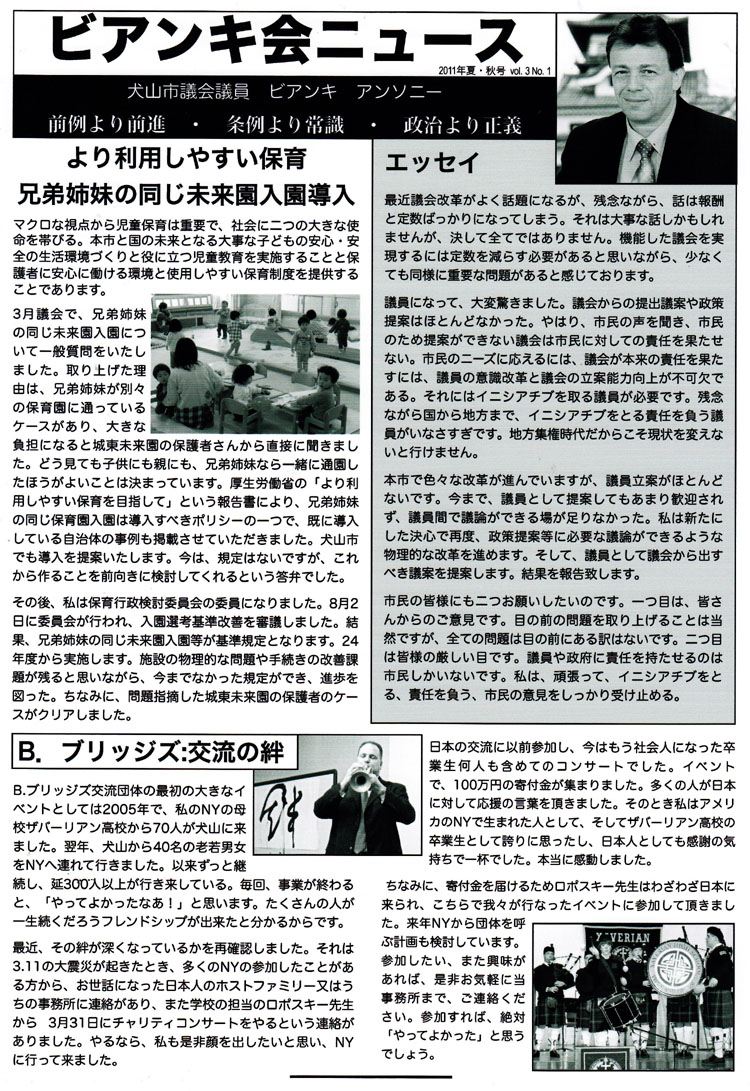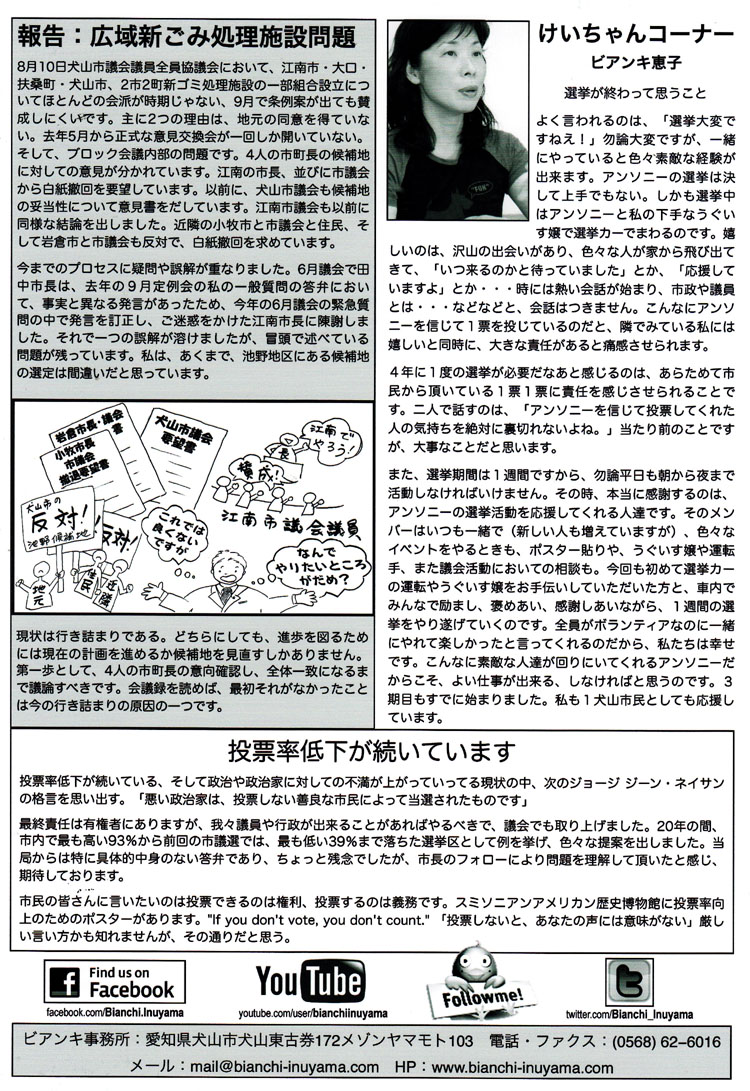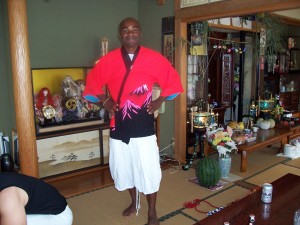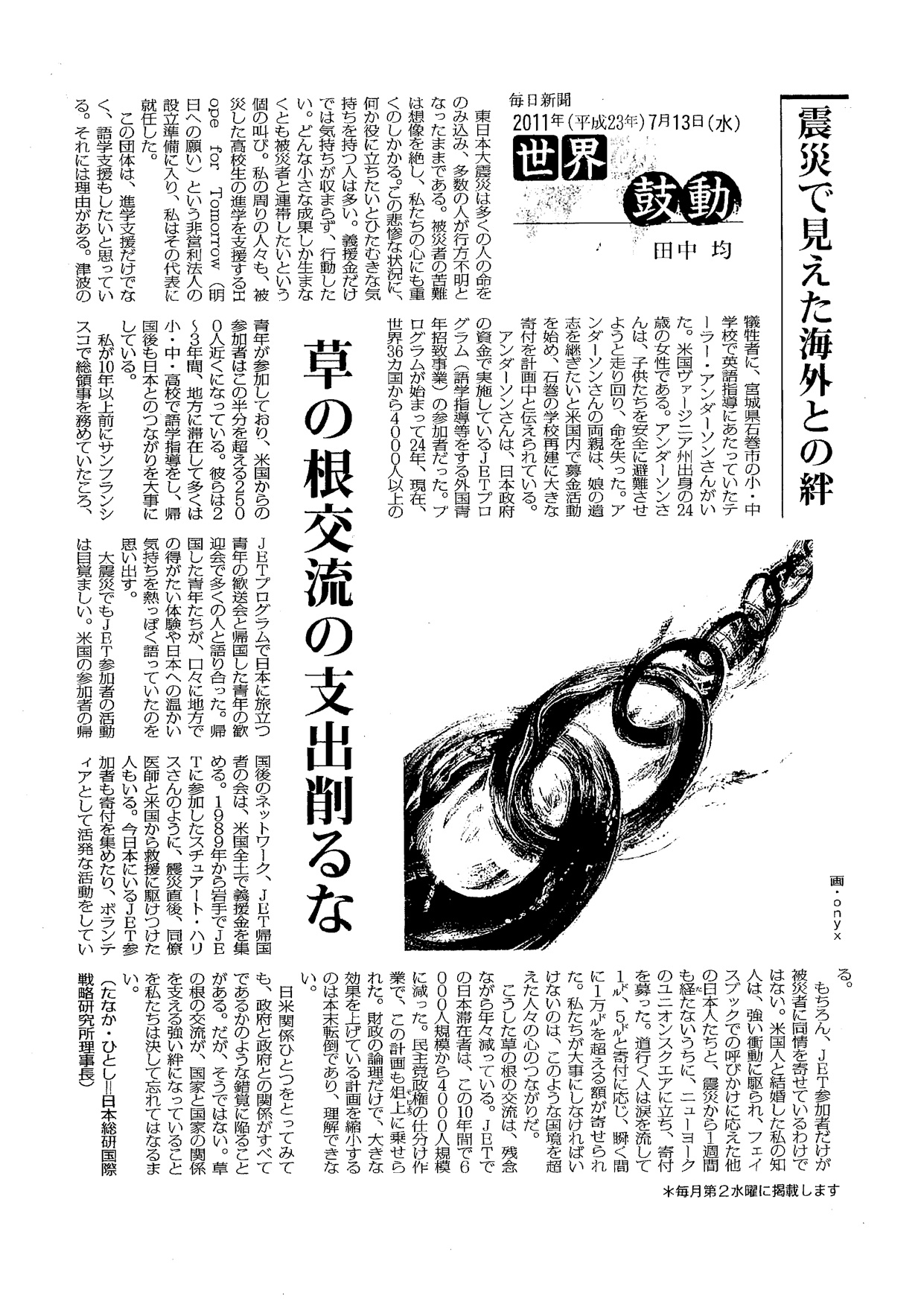Latest Newsletter from Councilman Anthony Bianchi
************
Here’s the newest newsletter from JET alum and Inuyama City Council Member Anthony Bianchi (Aichi-ken, Inuyama-shi, 1988-89):
***Page 1***
CLICK HERE for more JETwit posts about Anthony Bianchi.
Show off your translating skills! An English translation or summary of some or all of the above would be great if any readers are up for it. Full credit will be given!
By Rashaad Jorden (Yamagata-ken, 2008-2010) for JQ magazine. Rashaad worked at four elementary schools and three junior high schools on JET, and taught a weekly conversion class in Haguro (his village) to adults. He completed the Tokyo Marathon in 2010, and was also a member of a taiko group in Haguro.
It was the best of times. It was the worst of times.
Those two sentences are a lot more than the beginning of A Tale of Two Cities. The former could best describe my time in the JET Program (with a couple of exceptions), while the latter is an accurate description of my post-JET time.
I was disappointed and sad to leave Yamagata Prefecture last year, but the old saying “when one door closes, another one opens” came to my mind. As much as I enjoyed Japan, I was eager to launch my new life in the U.S.
Since I had talked myself out of grad school for the time being, I figured I ought to put something worthwhile on my resume before commencing the serious job hunt. As my resume included mostly teaching English abroad (France and Japan), I figured I might as well do something related to what I eventually want to do: something editorial related.
Currently, I am seeking an editorial assistant/copy editor/proofreading position. But I would also open to working for cultural exchange programs and in positions that utilize French ability (I am fluent in the language due to having and worked in France).
JET alum James Kennedy reviews “Super Mario” for WSJ Book Review
 James Kennedy (Nara-ken, 2004-06), author of the acclaimed young adult novel The Order of Odd-Fish, just did a Wall Street Journal book review of SUPER MARIO, Jeff Ryan’s history of Nintendo.
James Kennedy (Nara-ken, 2004-06), author of the acclaimed young adult novel The Order of Odd-Fish, just did a Wall Street Journal book review of SUPER MARIO, Jeff Ryan’s history of Nintendo.
In the article, James apparently also had the chance to correct some bad Japanese in his book. (Who says the JET program doesn’t teach marketable skills?)
“Errors crop up. Speculating on the name of Mario’s evil twin, Wario, Mr. Ryan claims that “in Japanese, wariu means bad.” Actually, the Japanese is warui.”
The book review was in Friday’s print WSJ, and here it is online: http://on.wsj.com/paNu5f
Another Canadian JET to visit Tohoku via the MOFA program
Turns out the Ottowa Citizen article was not entirely correct about Brent Stirling (Fukushima-ken, Fukushima-shi, 2006-10) being the only Canadian among the 20 ex-JETs selected for the MOFA program to go back to their town/city in Tohoku, help with volunteering and write about and share their experience.
But the post on JETwit about the article did help generate a response from Toronto-based JET alum Tanya Gardecky (Miyagi-ken, Shiogama-shi) who will also be participating and whose travel blog you can follow here: http://www.travelblog.org/Bloggers/ShiogamaJET/
********************
Here are a few JET-related articles and radio piece written and produced in the past month by JET Alum Bluegrass Subchapter member Graham Shelby (Fukushima-ken). (Thanks to Graham for sharing the info.)
- Graham went to Nashville at the end of July to interview some of the new JETs about to depart from the consulate there. Here’s a radio piece he produced that aired this past week on the public radio station here in Louisville. (It’s short.)
http://www.wfpl.org/2011/08/15/audio-new-teachers-prepare-for-life-in-japan/
- Graham also put together a quick piece focusing on one of new JETs who happens to be headed to Fukushima. It aired a few times on NPR’s national newscasts during Morning Edition on August 1. They don’t archive the newscasts online, the newscaster’s intro sounded something like this:
“While many people are struggling to find jobs, hundreds of Americans, many of them recent college graduates, have found an employer eager to hire them – in Japan. From member station WFPL, Graham Shelby has more.”
- Lastly, Graham did another short piece that was Kentucky-specific that was picked up by a few stations here.http://www.wfpl.org/2011/07/30/kentuckians-prepare-for-japanese-teaching-assignments/
As Graham’s work demonstrates, there are clearly opportunities to find and tell compelling stories from the world of JETs and former JETs. If you have any ideas, angles, upcoming events or possible outlets in mind, please feel free to contact Graham gshelby3 [at] gmail.com.
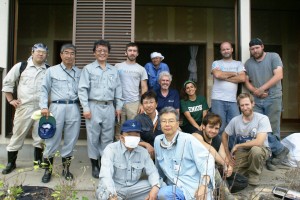
All Hands volunteers and 3M workers take a break from tearing down drywall to enjoy a delicious bento lunch. All Hands executive director and founder David Campbell, center, T.R., second row, far right. (Eric Zdenek)
By T.R. Pearson (Shiga-ken, 2004-06) for JQ magazine. T.R. currently works in the Admission Office at Riverdale Country School in the Bronx, New York. This was his third deployment with All Hands after volunteering in Indonesia in 2006 and Bangladesh in 2008. If you’d like more information on All Hands, he can be reached at theodoreroyce[at]gmail.com.
I’m sure most JETs remember the influx of e-mails after every typhoon or earthquake in Japan. It didn’t matter if you lived hundreds of miles away on a different island, family members and friends wanted to know you were safe. With the exception of a couple rumbles and some violent windstorms, my time as an ALT in Nagahama, Shiga-ken was relatively peaceful. While earthquakes in Japan are always a concern, the scale of devastation that occurred on March 11, 2011 was unimaginable and unpredictable. Watching coverage from my home in New York, I was now the worried person sending e-mails to friends and researching ways I could help. I found my answer on March 14 when I received a message from the international disaster relief organization All Hands entitled “Japan Tsunami Assessment.”
Three days after the quake, executive director David Campbell and international operations director Marc Young, were on the ground surveying the damage and meeting with local governments to discuss possible response projects. As Marc said in his e-mail, “the best way to really understand the situation is to be there on the ground, and make important decisions from that perspective.” After encountering some refusal for assistance in certain areas, the mayors of Ofunato and Rikuzentakata in Iwate-ken graciously opened their arms and their cities to All Hands to coordinate relief efforts, recruit volunteers, and distribute fresh food through a partnership with Second Harvest Japan. A month after All Hands launched Project Tohoku, they received over 4,000 applications from eager volunteers. Initially, the organization requested people with Japanese language skills and cultural knowledge to expedite the work that needed to be done. This made JET alums and current expats living in Japan perfect candidates to get involved.
Much like the JET Program, All Hands attracts people from all over the world at different stages in their lives. To date, All Hands has brought in over 539 volunteers from 28 countries. When I was there in June, I worked alongside college students on summer break, backpackers who rearranged their travel schedules, mid-career professionals who quit unfulfilling jobs, nurses with extensive international experience, and of course, JET alumni. Certain aspects of the JET Program mirrored this experience as we navigated an unfamiliar landscape, discussed Japanese culture, talked about our hometowns, sang our hearts out in karaoke booths, shopped at the grocery store, and lived in a community as if it were our own.
Tsunami: JET alum Harvard professor Ian Miller’s NY Times article
*************
Thanks to a recent conversation with Peter Kelley, President of the National Association of Japan-America Societies, I just learned of this New York Times article by Harvard history professor and JET alum Ian Miller (Miyagi-ken, Miyako-shi) which ran March 19, 2011.
Bitter Legacy, Injured Coast
http://www.nytimes.com/2011/03/20/opinion/20miller.html?_r=1&pagewanted=1
By IAN JARED MILLER
Cambridge, Mass.
THE rugged Sanriku Coast of northeastern Japan is among the most beautiful places in the country. The white stone islands outside the port town of Miyako are magnificent. The Buddhist monk Reikyo could think of nothing but paradise when he first saw them in the 17th century. “It is the shore of the pure land,” he is said to have uttered in wonder, citing the common name for nirvana.
Reikyo’s name for the place stuck. Jodogahama, or Pure Land Beach, is the main gateway to the Rikuchu Kaigan National Park, a crenellated seashore of spectacular rock pillars, sheer cliffs, deep inlets and narrow river valleys that covers 100 miles of rural coastline. It is a region much like Down East Maine, full of small, tight-knit communities of hardworking people who earn their livelihoods from tourism and fishing. Sushi chefs around the country prize Sanriku abalone, cuttlefish and sea urchin.
Today that coast is at the center of one of the worst disasters in Japanese history. Despite the investment of billions of yen in disaster mitigation technology and the institution of robust building codes, entire villages have been swept out to sea. In some places little remains but piles of anonymous debris and concrete foundations.
I taught school in Miyako for more than two years in the 1990s, and it was while hiking in the mountains above one of those picturesque fishing villages that I came across my first material reminder of the intricate relationship between the area’s breathtaking geography, its people — generous and direct — and powerful seismic forces.
On a hot summer day a group of middle-school boys set out to introduce me to their town, a hamlet just north of Pure Land Beach. While I started up the steep mountainside the children bounced ahead of me, teasing me that I moved slowly for someone so tall. “Are you as tall as Michael Jordan, Miller-sensei?” yelled one boy as he shot past me up the trail.
“Not quite,” I told him, pausing on a spot of level ground to look out over the neat collection of tile roofs and gardens that filled the back of a narrow, high-walled bay.
“What is this?” I asked, pointing to a mossy stone marker that occupied the rest of the brief plateau. A chorus of young voices told me that it was the high-water mark for the area’s biggest tsunami: more than 50 feet above the valley floor.
“When was that?” I asked, but the boys couldn’t say. Read More
The official trailer for Naoko Ogigami’s Toilet, screened at Japan Society July 2011.
By Stacy Smith (Kumamoto-ken CIR, 2000-03) for JQ magazine. Stacy is a professional writer/interpreter/translator. She starts her day by watching Fujisankei’s newscast in Japanese, and shares some of the interesting tidbits and trends together with her own observation in the periodic series WITLife.
I was able to catch Naoko Ogigami’s Megane (Glasses) when it was shown in March 2009 as part of the ContemporAsian film exhibition at New York’s Museum of Modern Art, so I was glad to see her newest film Toilet was being screened at Japan Society’s recent JAPAN CUTS film festival. I appreciated the simplicity and quirkiness of this first feature, but I liked the second one even better for its humor.
Both star Ogigami staple Masako Motai, an actress whose presence always greatly enhances whatever work she is in. Because Toilet is almost entirely in English, it is palatable for those who want to see a foreign movie without dealing with those pesky subtitles. It is supposedly set in the U.S., but it was actually produced in Toronto (Ogigami studied film at USC and in Canada).
Toilet opens with the death of the matriarch of a family of three adult siblings, Ray, Maury and Lisa. The movie’s center is Ray, an emotionless engineer with a fondness for plastic models. A fire in his apartment forces him (toy collection in tow) to move home with Maury and Lisa, who live in the house they grew up in. The audience finds out that shortly before she passed away, their mother went to Japan to bring her mother back with her. Their grandmother Baa-chan doesn’t speak any English and leads a silent existence, despite them all living together. Initially the family member with whom she seems to get along best is the household cat, Sensei.
***************
This editorial in support of the JET Programme by Hitoshi Tanaka appeared originally in Japanese in The Mainichi Daily News. Thanks to Jim Gannon (Ehime-ken, 1992-94), Executive Director of the Japan Center for International Exchange (JCIE/USA), for sharing the article. And special thanks to Laura Kamutaka (CIR Miyagi-ken, Shiogama-shi, 2005-07) for translating it into English.
Don’t Cut Funding of Grassroots Exchange: Earthquake reveals and affirms overseas bond
http://www.jri.co.jp/MediaLibrary/file/report/tanaka/pdf/5570.pdf
Tanaka Hitoshi, Chairman, Institute for International Strategy, Japan Research Institute
The Tohoku earthquake swallowed many lives and left many missing. The unimaginable hardship of the disaster victims weighs heavily on our hearts, and many of us have a strong desire to help with this tragic situation. People who want to take action beyond making a charitable donation. People who want to work together with the disaster victims in any capacity, no matter how small the achievement. Some of those around me set up a nonprofit called Hope for Tomorrow to assist high school students affected by the earthquake, of which I’ve become a representative.
”Hope for Tomorrow” is designed to not only assist the students advancement but to help develop their language skills as well. There’s a reason for this. One of the tsunami victims was Taylor Anderson, an Assistant Language Teacher in Ishinomaki City of Miyagi Prefecture who taught English at both elementary and junior high schools. After the earthquake, the 24-year-old Virginia, US native worked to ensure her students’ safety and, in doing so, lost her life. In honor of her memory, Anderson’s parents have been collecting US donations with the intention of sending them to Japan to help restore school in Ishinomaki.
Anderson was in Japan through the JET Program, a Japanese government program that invites international youth to help Japanese students with foreign language instruction. After 24 years of existence, the program currently boasts over 4,000 participants from 36 countries, with over half coming from the United States. Most participants stay in Japan from two to three years, teach elementary to high school-level Japanese students, and maintain a strong bond with Japan even after returning to their home countries.
Ten years ago when I served as the Consulate General in San Francisco, I spoke with both JET participants who were about to leave for Japan and those that had recently returned. I remember those that returned all spoke passionately of their experiences and had great affection for Japan.
Even the JET participants’ response to the earthquake is remarkable. The JET Alumni Association has chapters across the country working to fundraise for relief efforts. There are those such as Stuart Harris, a JET participant in Iwate prefecture in 1989 who assembled a team of doctors right after the earthquake to provide relief to Japan. JET participants currently in Japan have also collected donations and vigorously volunteered to the relief effort.
Of course, it isn’t only the JET participants that have shown compassion towards Japan. A friend of mine who married an American found a network of people on Facebook, leading them to New York’s Union Square to collect donations less than a week after the earthquake. Passersby would donate cash and in no time more than $10,000 had been raised. We need to protect these precious bonds that transcend national lines.
Unfortunately, this kind of grassroots exchange has been decreasing each year. The number of JET participants has gone from 6,000 participants 10 years ago to 4,000. The Democratic Party of Japan has included the JET program in its budget cuts. From a financial standpoint alone, it seems counterintuitive to shrink a program that yields such positive results.
It is easy to see the Japan-US ties mainly through the relationship between the two governments. But that’s not true. Grassroots exchange is what sustains the important bond between the two countries and is something we must never forget.
JQ Magazine: Book Review – ‘The Beautiful One Has Come,’ short stories by JET alum author Suzanne Kamata
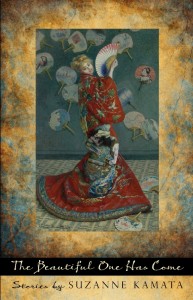
“The stories in The Beautiful One Has Come have a universal appeal but will strike a familiar note in particular with those who have spent considerable time outside their comfort zones.” (Wyatt-MacKenzie Publishing)
By Sharona Moskowitz (Fukuoka-ken, 2000-01) for JQ magazine. Sharona works at a literary agency in New York City. She is interested in fresh, new voices in fiction and creative nonfiction.
I began reading Suzanne Kamata (Tokushima-ken, 1988-1990)’s new collection of short stories with no idea what to expect and a sense of up-for-anything enthusiasm. Luckily, that feeling stayed with me throughout the collection and renewed itself automatically as I approached each new story.
There’s an enjoyably uncomfortable tension contained within the pages of The Beautiful One Has Come and it’s precisely that tension, paired with Kamata’s ability to glide between narrative points of view, that makes this collection so strong. The characters who inhabit the pages feel so true I could practically hear their pulses.
The physical settings of the stories vary from Cuba to Egypt to France to Japan among other countries, but the characters seem to inhabit spaces all their own: their minds are the true sites of conflict. The stories deal mostly with women in various states of transition; feeling like outsiders while negotiating their own identities, striving for something just out of reach, or trying to come to terms with loss. There is the foreign housewife who longs for the comforts of her native land, the elderly artist whose husband wrongfully gets the credit for the paintings she has created and the Japanese girl who is obsessed with studying abroad in Egypt.
Though these profiles might sound familiar, each story is buoyed by unique and unexpected details which keep the characters from sinking into stereotypes.
Justin’s Japan: Interview with Billy Sheehan of Mr. Big on Touring Tohoku

Billy Sheehan, right, with Mr. Big: "We had raised about $100,000 for the earthquake relief, and there’s still more to be raised, too. In the end, we raised a bunch of money, and we got a special letter from the Japanese Embassy in Washington, D.C. thanking us for being there." (William Hames)
By JQ magazine editor Justin Tedaldi (CIR Kobe-shi, 2001-02) for Examiner.com. Visit his page here for related stories.
One of the most respected bassists and gentlemen in the music world, Billy Sheehan is back with Mr. Big, the Los Angeles-based rock band he formed in 1988 best known for the hit ballad “To Be with You,” which shot to number one in 15 countries, including the U.S., in 1992. After splitting a decade later, in 2009 the original lineup reformed, followed by the release of What If…, the first album in 15 years from the original lineup.
Now, American fans are finally going to get a chance to see Billy, Paul Gilbert, Eric Martin and Pat Torpey together on stage since their ’90s heyday for a month-long American tour beginning Saturday (July 30) at San Diego’s 4th & B. In this exclusive interview, I spoke with Billy on Mr. Big’s current jaunt around the world, their triumphant return to Japan (where the band is revered), and the possibility of another album from the guys.
So far this year Mr. Big has played all over Europe, Asia and South America. What have your highlights been?
Japan is always amazing. The most difficult thing about touring is getting to and from the gigs…once we’re onstage, there’s no trouble at all, and in Japan, it’s just a breeze. We don’t fly in much, and take a lot of bullet trains, which are super convenient and easy and clean and safe and fast and everything. So Japan is always easy. The rest of Southeast Asia was actually pretty cool, too. We were supposed to do two shows in China, but the Shanghai show got cancelled because the promoters had the wrong visa for us. The shows in Korea, Taiwan and the Philippines were unbelievable, and in Taiwan we actually had to speed away from the venue in a van with literally crowds of people chasing after us (laughs). It was hilarious.
Mr. Big toured Japan less than one month after the earthquake and tsunami, and even did gigs in Iwate and Miyagi Prefectures, the areas most affected by the devastation. What was that experience like?
Really touching. There was a [camera] crew meeting us at the airport and then following us around, and we didn’t know, but they went out in the crowd and interviewed a lot of people, so later on we saw that they had interviewed a guy…I think he was from Sendai. They interviewed him for television, and we didn’t see it until we saw the show. He’d lost everything, and a couple of friends and family, and he’d lost his entire Mr. Big collection, so he actually came to the show to start his collection over again. And I’m telling you, it was so touching, this poor guy, that in his life, the important thing was to come and get his music back together again, really amazing. We had raised about $100,000 for the earthquake relief, and there’s still more to be raised, too—I just saw another $22,000, and I have to see what the figures are for the downloads of the special song we did [“The World Is on the Way”], also, so there’s a bunch more, too.
In the end, we raised a bunch of money, and we got a special letter from the Japanese Embassy in Washington, D.C. [signed by Ambassador Ichiro Fujisaki] thanking us for being there. We didn’t know how it would go when we went there, was it too soon or not, but [remember] after 9/11, where after the dust cleared, all the playhouses and restaurants were going out of business because nobody was going to New York City, so what helped was that going to see a show and having dinner to help the economy rolling again, so we were hoping to get that idea happening. We heard from saké dealers that were going out of business because nobody was drinking because they were all in mourning, you know? It’s a shame that so many lives were lost, but one of the most important things after anything like that is to get back up on your feet again. So I think we helped a bit—I’m cautiously optimistic to say I think we helped a bit. And from the tone of the e-mails and speaking with people after the show, we’re very pleased. So it all ended good.
Was there any hesitation at all about playing those gigs because of the radiation?
For me, no. A couple of the guys in the band were a little concerned about it. I fly transoceanic all the time [across] the Pacific, and you get a dose of radiation every time you do that. I think it’s equivalent to—I forget the figure—one, two or three chest X-rays just by flying over the ocean. And I do know that radiation, to incite fear in people, is almost second to none, you know? It’s invisible, and you don’t know it’s there and the next thing you know, you’ve got a problem. So I knew that there was probably some elevated degree of danger, but I also know that most things of that nature are over-exaggerated, in my experience with my own personal catastrophes of earthquakes and whatever else. They really do overblow it.
So I wasn’t worried personally, but we were more concerned for the fans, and I know that the Japanese government is very conscientious with their safety and rules. I remember I was in Tokyo one time, and there was a typhoon warning for everyone to stay inside. This was years ago, and I was out with a friend of mine, we were walking around, and the streets were deserted; there was nobody anywhere…the people in Japan are really in tune with the warnings and such. And I found out the government wouldn’t have allowed [us] to go on if we were to put a crowd of people in danger, so there was that factor, as well. So a couple of the guys in the band were a little worried about it, but I was okay with it, and in the end, all of us are glad we did it.
For the complete interview, click here.
For Justin’s February 2011 interview with Billy, click here.
JQ Magazine: Four Cups of Sake, ‘Three☆Points,’ Two Beers, and One Night with Sora Aoi
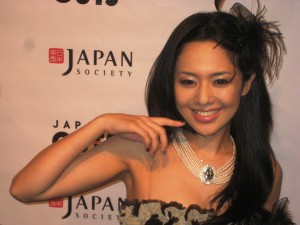
Sora Aoi at New York's Japan Society for the ‘Three☆Points’ premiere, July 15, 2011. (Justin Tedaldi)
By Rick Ambrosio (Ibaraki-ken, 2006-08) for JQ magazine. Rick manages the JET Alumni Association of New York (JETAANY)’s Twitter page and is the creator of the JETwit column Tadaima!
So I’m here to give you my Three☆Points review. I’m sure you’ll find it somewhere down there. I mean I could just write you about the movie. but that would be unfair, it would be out of context, it would be devoid of what makes this process fun. You see, New York’s Japan Society once again pulled out all the stops for their JAPAN CUTS film festival, and tonight was its apex; the American Premiere of Three☆Points, with a Q&A from actress Sora Aoi and director Blah Blah something Japanese. Not to mention an after party with a DJ, food, and all the beer you can drink. Reviewing things has its perks. If for some reason you don’t know who Sora Aoi is, please, by all means, look her up, Google her. Try doing it at work, under unfiltered pictures. Have your boss and co-workers gather around. It’ll be totally appropriate.
But anyways, there I am at Megu, the uber-fancy restaurant in the Trump World Tower next door to Japan Society. It was Restaurant Week in NYC, so two friends of mine and my girlfriend accompanied me there for a pre-show meal. Little did I know the dinner would be so light on “meal” and heavy on sake-tasting. It was supposed to only be three sakes but they messed up and gave us four. Not so much a problem, but at a place where a single person can easily drop $200 on a meal, going for Restaurant Week and only paying $35 a person results in a curtailed dining experience, no matter how delicious.
So after demolishing a breaded asparagus, a smattering of fresh sushi and a fantastic green tea crepe, I stumbled over to Japan Society ready for my date with destiny. Of course, that would need a moment, since four sakes meant I needed to use the men’s room. The line was out the door, though. People had come out en masse to see Ms. Aoi. I waved to a couple of the volunteers I knew as I jogged down the stairs towards the bathroom. My girlfriend was along for the fun as well, and she darted into the women’s room.
On exiting I lingered, waiting for my girlfriend. I watched where the serpentine line ended; at the opening to the 300-plus seat, meticulously clean theater in Japan Society. I knew both the ticket takers. I debated in my head as to if I should attempt to cut all the eager people in line with a high five to score good seats and impress my girlfriend. My “don’t be a douche” motto rendered this plan a bad idea, and instead just patiently, drunkenly waited for the poor girl who got stuck dating me.
JQ Magazine: Theatre Review – Amon Miyamoto’s ‘The Temple of the Golden Pavilion’
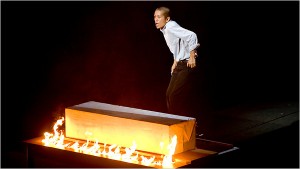
Go Morita in a scene from 'The Temple of the Golden Pavilion' at New York's Lincoln Center Festival. (Stephanie Berger)
By Lyle Sylvander (Yokohama-shi, 2001-02) for JQ magazine. Lyle is entering a master’s program at the School of International and Public Affairs at Columbia University (MIA 2013) and has been writing for the JET Alumni Association since 2004. He is also the goalkeeper for FC Japan, a NYC-based soccer team.
In 1950, a young Buddhist monk committed a notorious act of arson and destroyed the ancient Kinkakuji Temple in Kyoto, Japan. Yukio Mishima, Japan’s preeminent novelist at the time, fictionalized the events in Kinkakuji, published in 1956 and translated into English as The Temple of the Golden Pavilion in 1959. While the actual arsonist was diagnosed with paranoid schizophrenia, Mishima presented an elaborately detailed psychological study of a disturbed man, incorporating elements of Buddhist and ancient Greek philosophical reflections on the impermanence of beauty and the conflicts between idealism and reality. The novel helped cement Mishima’s worldwide literary reputation and inspired numerous adaptations, including an opera, a modern dance ballet and two film versions.
Now, the director Amon Miyamoto, previously represented in New York by his production of Stephen Sondheim’s Pacific Overtures, has adapted the story into a full-fledged theatrical production. Having premiered last year at Miyamoto’s Kanagawa Arts Theatre (KAAT) in Yokohama, the production was presented intact by the annual Lincoln Center Festival in New York from July 21-24 with its original cast, led by J-pop star Go Morita of the boy band V6.
In presenting his version of the story, Miyamoto (who co-wrote the script with Chihiro Ito) relies on an arsenal of visual conventions, from multimedia projections to Western theatrical blocking to Japanese austerity. Most of the play is presented on a wooden stage suggestive of an old classroom, a fitting visual component of the temple grounds’ claustrophobic enclave. Mizoguchi, the monk’s name in Mishima’s version, is played by Morita as an awkward stutterer who creates a vibrant interior world at odds with his disappointing reality.
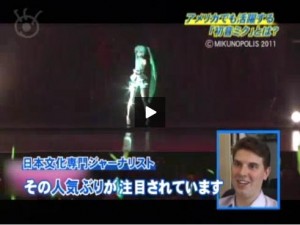
JQ magazine editor Justin Tedaldi talks Hatsune Miku on FCI's "Today's Eye" segment. (Courtesy Fujisankei Communications International)
JQ magazine editor/Japanese Culture Examiner Justin Tedaldi (CIR Kobe-shi, 2001-02) was recently interviewed by Fujisankei (FCI) News on Japan’s virtual pop idol Hatsune Miku for their “Today’s Eye” segment broadcast this week on Japanese TV!
Miku is the star of Toyota’s summer Corolla ad campaign in the U.S., and earlier this month performed to massive crowds at L.A.’s Nokia Theatre and the San Diego Comic-Con! Check out the video here or click on the image for Justin’s comments.
Direct link: www.fujisankei.com/video_library/event/hatsunemiku.html
Justin’s Japan: Lincoln Center Festival Premieres ‘Temple of the Golden Pavilion’
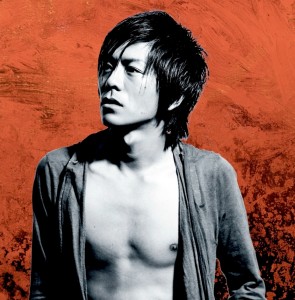
J-pop singer Go Morita stars in director Amon Miyamoto's stage adaptation of 'The Temple of the Golden Pavilion' for the Lincoln Center Festival July 21-24. (Miow Hirota)
By JQ magazine editor Justin Tedaldi (CIR Kobe-shi, 2001-02) for Examiner.com. Visit his page here for related stories.
On Thursday (July 21), this year’s edition of the Lincoln Center Festival will present the U.S. theatrical premiere of director Amon Miyamoto’s The Temple of the Golden Pavilion, based on Kinkakuji, the celebrated 1956 novel by Japan’s storied 20th century writer Yukio Mishima.
With a script co-written by Miyamoto and playwright Chihiro Ito, the play will run through July 24 at Columbus Center’s elegant Rose Theater.The Temple of the Golden Pavilion is a stunning tale of the power of beauty and its corruption of the mind of a young monk, Mizoguchi, who becomes obsessed with beauty’s destruction. This groundbreaking work paints an intensely personal picture of Japan in the crucible of the Second World War.
A native of Tokyo and the artistic director of the new Kanagawa Arts Theatre in Yokohama, Miyamoto hosted a special lecture last month at New York’s Japan Society. He made his Lincoln Center Festivaldebut in 2002 with a memorable production of Stephen Sondheim and John Weidman’s Pacific Overtures at Avery Fisher Hall, which moved on to the Kennedy Center for the Performing Arts and a Broadway revival from 2004 to 2005.
For the complete story, click here.

